Key takeaways:
- Consumer behavior in the perfume retail industry is significantly influenced by personal preference, social validation, and seasonal trends.
- Top beauty sales highlight consumer preferences and shape future fragrance trends, fostering community and brand loyalty.
- Strong branding and marketing can transform fragrances into status symbols, driving consumer engagement and sales.
- Creating memorable shopping experiences through personalized consultations, social media engagement, and educational content enhances customer connection and loyalty.
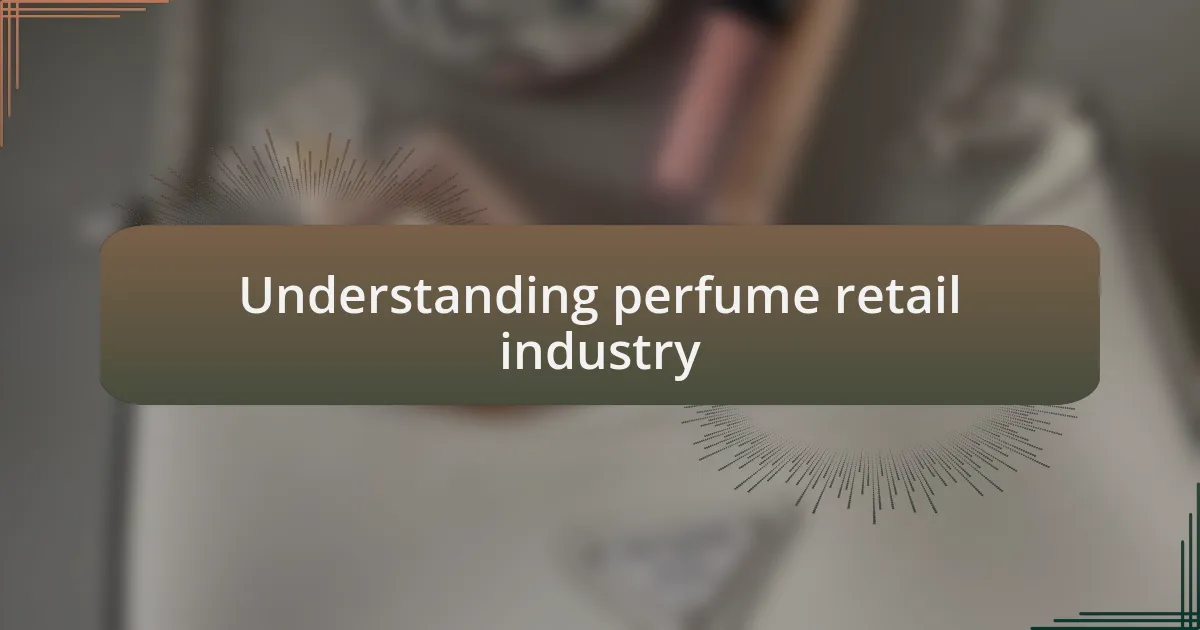
Understanding perfume retail industry
The perfume retail industry is a fascinating blend of art and commerce. I recall my first experience walking into a high-end fragrance boutique; the ambiance was intoxicating, filled with unique scents that told a story. Each bottle seemed to capture a moment or a memory, making me wonder: how do these fragrances evoke such strong emotions?
With my experience in the industry, I’ve learned that consumer behavior in this sector is influenced by both personal preference and social trends. For instance, I once noticed how a popular celebrity endorsement dramatically shifted sales for a fragrance line. It got me thinking: how much do our choices in scent rely on social validation versus our own authentic tastes?
It’s also intriguing to consider the seasonal shifts that affect perfume sales. Reflecting on my own purchasing habits, I tend to reach for lighter, fresh scents in the summer and richer, deeper fragrances in winter. This seasonal pattern raises a question: how do retailers adapt their strategies to meet these evolving consumer preferences? Understanding these dynamics is crucial for anyone looking to thrive in the perfume retail space.
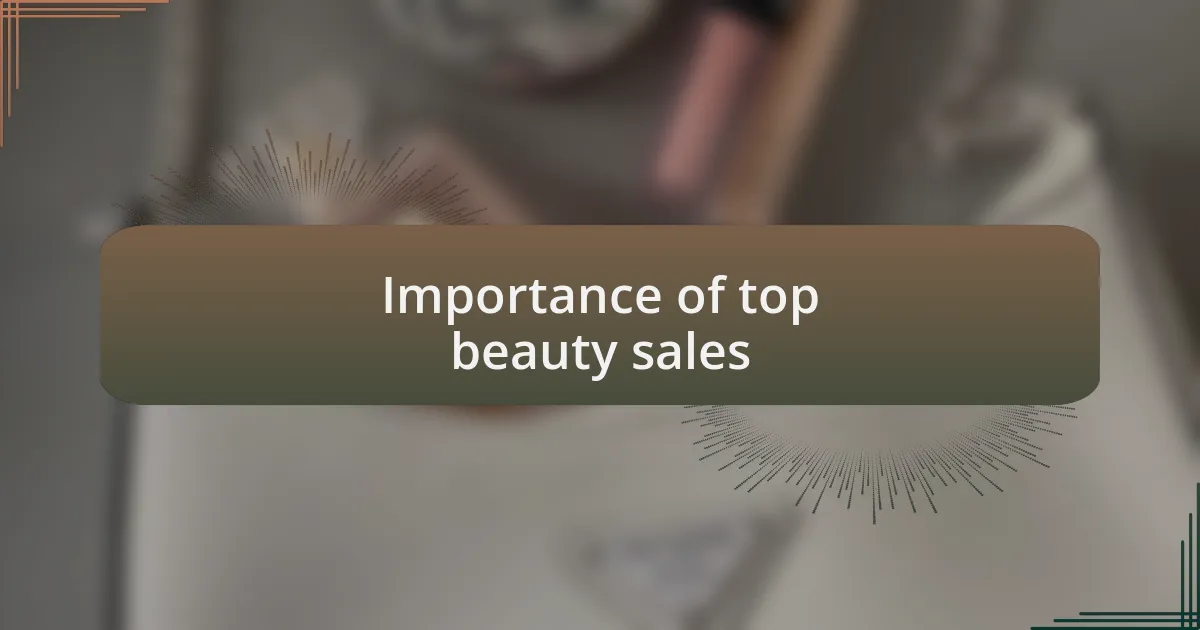
Importance of top beauty sales
The importance of top beauty sales cannot be overstated. I remember attending a beauty expo where I was struck by how top-selling products set trends across the industry. It made me realize that these sales not only highlight consumer preferences but also serve as a barometer for emerging trends in fragrances. When a perfume becomes a bestseller, it signals what people desire and helps shape future releases.
Looking back at my experiences in the beauty industry, I’ve seen how top beauty sales create a ripple effect that influences various aspects of retail strategy. For example, brands often use bestsellers as a foundation to launch new variations, tweaking scents based on what consumers crave. Have you ever noticed how a popular fragrance often leads to spin-offs? This strategy can invigorate a brand’s image and keep customers engaged.
Moreover, witnessing the impact of top beauty sales on brand loyalty is particularly fascinating. When a fragrance becomes a household name, it creates a community of enthusiasts. I often find myself in discussions with friends about our favorite scents, all stemming from a single bestselling perfume. This shared passion not only fuels sales but also fosters a deeper connection between consumers and brands. It’s amazing how one fragrance can lead to lasting relationships in this ever-evolving industry.
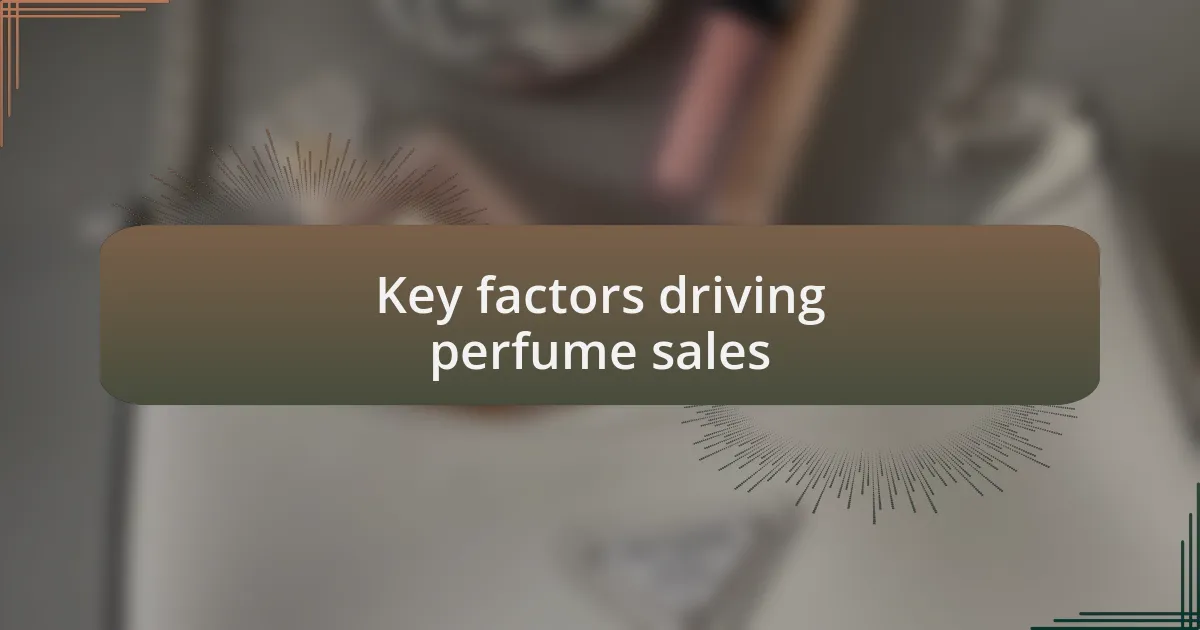
Key factors driving perfume sales
When I think about the key factors driving perfume sales, one major element comes to mind: the power of branding. I once attended a launch event for a luxury fragrance, and the atmosphere was electric, filled with influencers and media. It made me realize that strong branding can create an allure that attracts customers, turning fragrances into status symbols. Isn’t it fascinating how the right marketing campaign can elevate a perfume from just a scent to an essential part of one’s identity?
Another factor that’s crucial in driving sales is seasonal trends. I recall a time when everyone around me was raving about fresh, floral scents in the spring. I couldn’t help but join in, purchasing a popular spring fragrance that seemed to be everywhere. This seasonal shift in preferences demonstrates how our connection to nature and festivities shapes our buying decisions. Have you ever found yourself caught up in the excitement of a new season’s fragrance launch?
Finally, the rise of online shopping has significantly impacted perfume sales. I vividly remember the first time I ordered a scent online. The thrill of receiving that beautifully packaged bottle was unlike any experience I had before. The convenience of online access opens up new possibilities for consumers, allowing them to explore a wider range of fragrances at their own pace. It’s interesting to see how this shift has empowered shoppers to make more informed choices based on reviews and ratings. How has shopping for perfume changed your own habits?
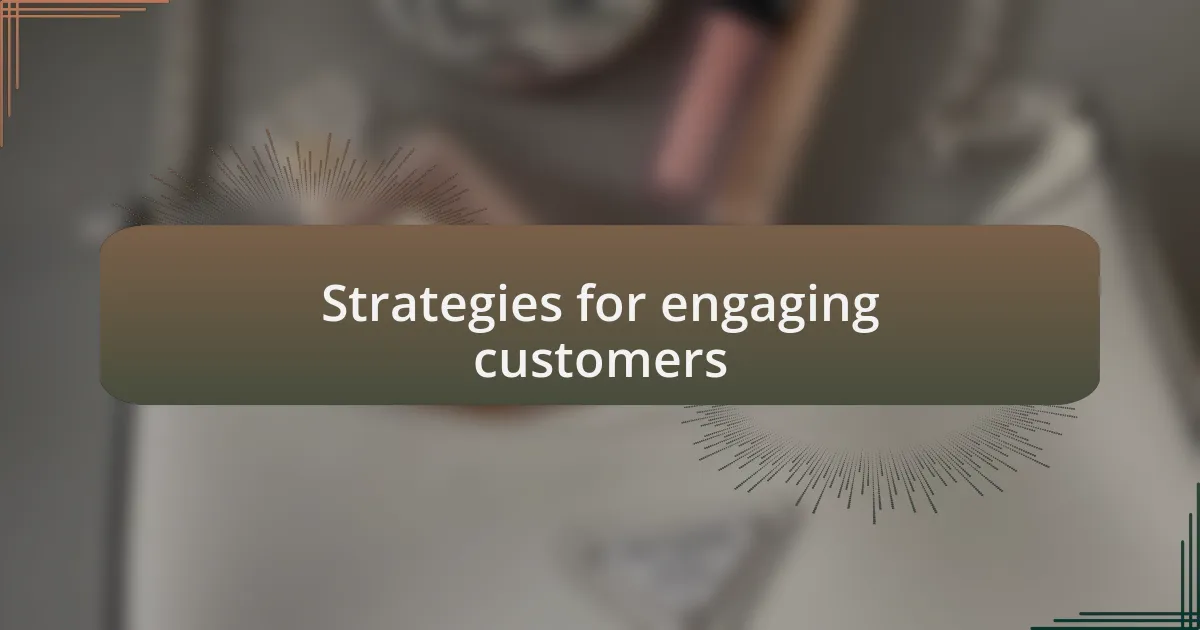
Strategies for engaging customers
When it comes to engaging customers effectively, creating memorable experiences is vital. I once visited a perfume retailer that offered personalized consultations, where a knowledgeable staff member helped me find scents based on my preferences and personality. That one-on-one interaction not only made me feel valued but also lengthened my visit, ultimately leading to a purchase I was genuinely excited about. Have you ever left a store feeling like the team truly understood your needs?
Another strategy involves leveraging social media to build a community around your brand. I remember seeing a captivating Instagram campaign where customers were encouraged to share their fragrance stories using a specific hashtag. This not only generated buzz but also fostered a sense of belonging, as people connected over their shared love for scents. Isn’t it amazing how social platforms can turn customers into brand advocates and storytellers?
Additionally, offering exclusive content, like behind-the-scenes looks at fragrance creation or tips on scent layering, can deepen customer engagement. I personally relish reading about how certain notes are blended to create a signature scent, making the experience feel more intimate and knowledgeable. This kind of content can transform a simple product purchase into an enriching adventure, don’t you think?
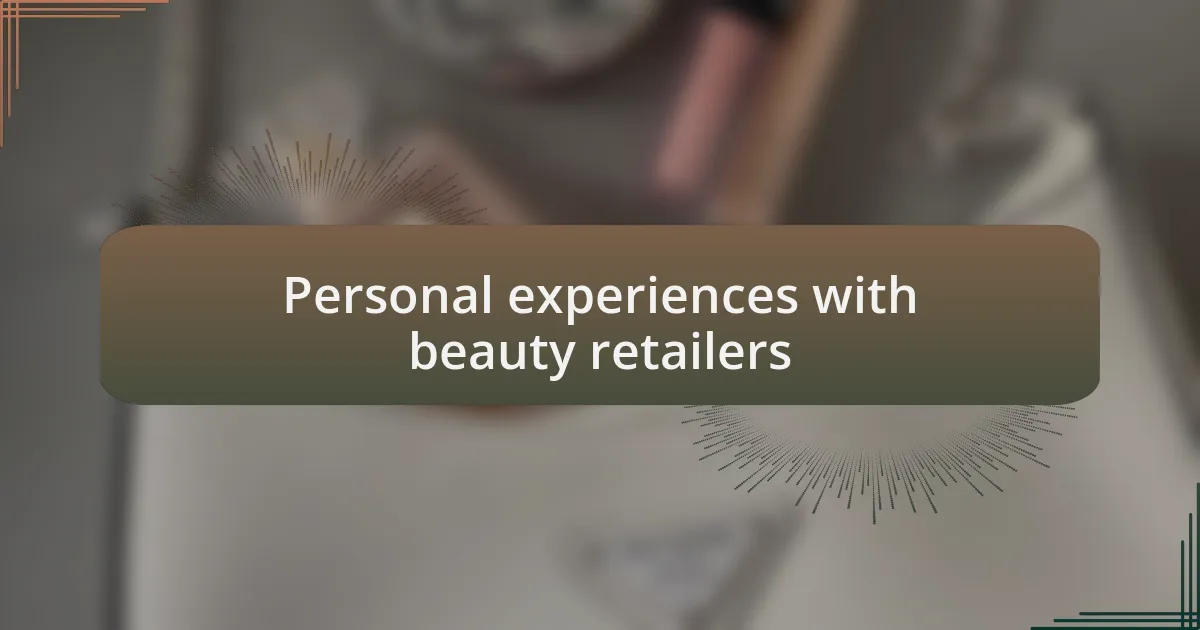
Personal experiences with beauty retailers
There was this one time I walked into a small, local beauty retailer looking for a gift. The staff greeted me warmly and took the time to ask about the recipient’s preferences, which really impressed me. It felt less like a transaction and more like a genuine conversation, and I left not only with the perfect perfume but also with a sense of satisfaction in supporting a local business.
In another experience, I decided to try a high-end beauty store that I had long heard about. I entered feeling a bit intimidated by the luxurious setting, but the sales associate approached me with patience and curiosity. She effortlessly shared tips and anecdotes about various fragrances, which sparked my interest and made me feel more confident in choosing a scent. Have you ever noticed how an engaging staff member can turn an overwhelming experience into a delightful one?
I’ll never forget the time I participated in an in-store fragrance event. The ambiance was vibrant, with live music and scent stations set up to explore different notes. I felt excited and inspired as I mingled with others who were equally passionate about perfumes. These experiences not only enhance my shopping but also create lasting memories that I treasure, reminding me of the bonds that fragrance can foster.
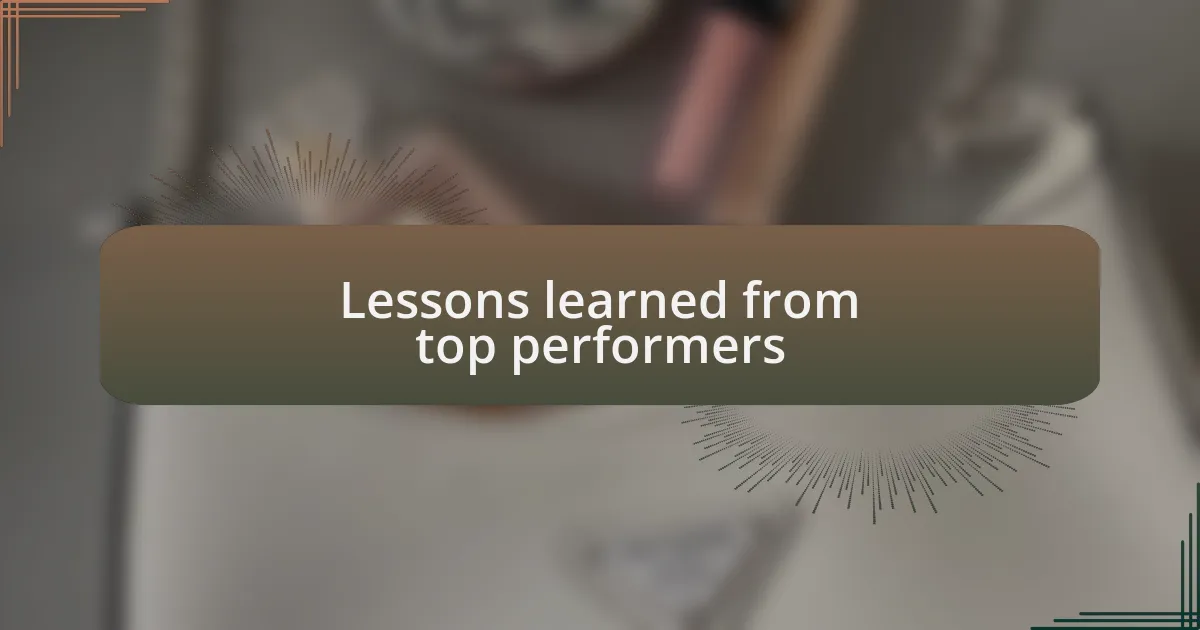
Lessons learned from top performers
The most striking lesson I’ve picked up from top beauty salespeople is the value of genuine connection. I remember a bustling fragrance showcase where a salesperson took the time to learn my favorite scent families. By recommending tailored options, she showed me that personalized guidance can transform a simple sale into a memorable experience. Isn’t it fascinating how a little effort in understanding a customer can lead to greater loyalty?
Additionally, I noticed that successful beauty salespeople often share their own stories related to products. At one event, a sales associate shared how a specific perfume reminded her of a treasured moment with her grandmother. This personal touch created an emotional link for me and made my decision feel significant rather than superficial. How powerful can a story be in making a purchase unforgettable?
I’ve also seen that top performers use their knowledge not just to sell but to educate. I once wandered into a shop, and instead of being pushed towards the most expensive options, I was guided through the scent layering process. This approach empowered me to appreciate scents more deeply and left me feeling more informed. Isn’t it remarkable how knowledge can enhance the shopping experience?